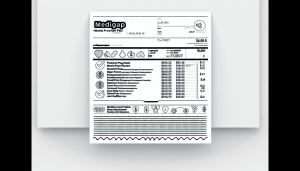Medigap
If you’re navigating the complexities of Medicare, you may wonder how to cover the costs that may be left uncovered by your plan. Medigap, a supplemental insurance, could bridge this financial gap. This article will explore what Medigap is, the expenses it might cover, and the selection process for choosing a policy.
By comparing Medigap to Medicare Advantage and discussing eligibility, this article aims to guide you on how to make an informed and confident decision about your healthcare coverage.
Key Takeaways
- Medigap, or Medicare Supplement Insurance, is a policy offered by private insurers that could cover gaps in Original Medicare coverage, such as copayments and deductibles, and may also be renewable regardless of health issues or if premiums have been paid.
- The potential costs of Medigap plans may vary widely based on possible factors like plan type, insurer, and personal details. It may also be important to understand both the monthly premiums and potential out-of-pocket costs that could be associated with each plan.
- Some of the Medigap plans may be standardized by the federal government which means every plan could offer the same benefits, but possible factors such as price, customer service, and additional benefits may differ between insurance providers.
Compare Plans in One Step!
Enter Zip Code
Deciphering Medigap: The Basics of Medicare Supplement Insurance

Medigap, also known as Medicare Supplement Insurance, is a policy offered by private insurance companies that could complement Original Medicare coverage. These plans could act like a safety net, potentially catching the out-of-pocket expenses that Original Medicare might not cover, including copayments, coinsurance, and deductibles.
One of the potential features of Medigap could be its renewable nature, which means that it could remain in effect irrespective of health issues, but only if premiums have been paid on time. This could offer a sense of security as your safety net will likely remain constant and reliable.
The Distinction Between Medigap Policies and Medicare Advantage Plans

While both Medigap and Medicare Advantage might be associated with Medicare, they serve different purposes.
Medicare Advantage will likely offer an alternative way to receive Medicare benefits, while Medigap could complement your Original Medicare coverage.
While Medigap policies may incur a higher cost relative to Medicare Advantage plans, they may offer enhanced coverage of medical expenses.
Navigating the Costs Associated with Medigap Plans

The potential cost of Medigap plans could be an important consideration for many. Some of these costs may vary significantly.
Possible factors that might contribute to this variation may include the specific plan type, the health insurer, and the beneficiary’s age, sex, location, and tobacco use.
However, it might not just be about the monthly premiums. Certain Medigap plans may also require out-of-pocket costs for specific covered services or may feature high deductibles that must be satisfied before coverage becomes effective.
Understanding the cost structure of Medigap plans will likely be necessary for making a well-considered choice.
Coverage Details: What Medigap Plans Will and Won’t Pay For

While Medigap policies could cover out-of-pocket expenses related to Original Medicare for Medicare beneficiaries, they might not cover everything.
For instance, they may not provide coverage for:
- Dental care
- Vision services
- Hearing aids
- Long-term care
- Private-duty nursing
Comprehending the specifics of what Medigap plans may and might not cover will likely be key to selecting an appropriate plan.
Understanding Your Coverage Options
With Medigap, you may have a variety of Medigap coverage options to choose from, including:
- Plans A
- Plan B
- Plan D
- Plan G
- Plan G-High Deductible
- Plan K
- Plan L
- Plan M
- Plan N
This diverse range of options could allow you to pick a plan that best suits your medical needs and financial situation.
However, it may be worth noting that even though different insurance companies might offer the same policy, the primary distinguishing factor will likely be the price.
Hence, it’s important to compare the costs of the same plan from different companies before finalizing a decision.
Beyond the Basics: Potential Benefits
Beyond the basic coverage, certain Medigap plans may offer additional benefits, including covered healthcare costs for excess charges that may arise when healthcare providers bill more than what Medicare is willing to reimburse.
This could be a beneficial feature for those who might need healthcare services that exceed Medicare-approved amounts.
Eligibility and Enrollment: Securing Your Medigap Policy

To be eligible for Medigap, you must meet the eligibility criteria for Medicare and be enrolled in both Medicare Part A and Part B.
Once you are eligible, the optimal time to enroll in a Medigap plan is during your Medigap Open Enrollment Period, which is a specific 6-month window during which you can enroll in any plan of your choice without the need to undergo medical underwriting.
Keep in mind that enrolling in a Medigap plan outside the open enrollment window may necessitate answering health-related questions during the enrollment process. This could potentially lead to higher premiums or refusal of policy purchases based on health status or medical history.
To enroll, call one of our licensed agents at 1-833-641-4938 (TTY 711), Mon-Fri 8 am-9 pm EST. They can provide comprehensive information, personalized guidance, and ongoing assistance to navigate the enrollment process for private insurance companies, making it easier for beneficiaries to make informed decisions about their healthcare.
Comparing Medigap Policies Across Private Insurance Companies
Since Medigap policies may be available from various private insurance companies, it will likely be vital to compare policies from different providers before settling on a decision.
Remember, the standardized Medigap policies with the same plan letter may be required to provide the same basic benefits regardless of the insurance company selling them. The main difference will likely lie in the cost.
When evaluating Medigap plans from different companies, you might want to consider potential factors such as:
- Cost
- Location
- Age
- Pre-existing condition waiting periods
Collaborating with a licensed Medicare agent can be beneficial as they can compare all letter plans with all carriers in your area, possibly ensuring you could receive the lowest premium without compromising on benefits.
Some of the top-rated private insurance companies that might offer private health insurance, including Medigap policies, are:
- AARP/UnitedHealthcare Medicare Supplement Insurance
- Blue Cross Blue Shield
- Mutual of Omaha
- Humana
- UnitedHealthcare
- Cigna
- AARP
The Possible Financial Implications of Medigap: Premiums and Cost-Sharing
The financial aspects of selecting a Medigap policy may extend beyond the price of the policy itself.
Medigap premiums will likely be determined by the insurance company, the specific plan chosen, and the geographic location. However, these amounts may fluctuate significantly based on the variables.
Beyond the monthly premium, there might also be extra costs that could be linked with Medigap policies. This could potentially highlight the need to understand both the premiums and possible cost-sharing aspects before opting for a Medigap policy.
Transitioning from Medicare Advantage to Medigap

If you’re currently enrolled in a Medicare Advantage plan but are considering a switch to Medigap, you should do so during specific enrollment periods or under certain circumstances.
You can transition from Medicare Advantage to Medigap without undergoing medical underwriting if you lose your Medicare Advantage coverage or if you want to revert to Original Medicare with a Medigap policy within your first year of being in Medicare Advantage.
However, transitioning outside of these periods may result in being subject to medical underwriting, which could lead to higher premiums or a potential refusal of policy purchase based on health status or medical history.
Federal Regulations and Standardization of Medigap Plans
Medigap plans will likely be standardized by the federal government, possibly ensuring consistent coverage options across providers. This means that no matter which insurance company you choose, the potential benefits of each Medigap plan might be the same, adhering to federal and state laws.
Despite this standardization, prices and customer service may vary from one provider to another. This could be due to differences in states, plan types, and the insurance providers themselves, which may have distinct pricing structures and varying levels of customer service.
Hence, it’s necessary to compare not only the coverage options but also the potential cost and quality of service from various providers.
Summary
Navigating the world of Medigap may seem complex, but with a clear understanding of the basics, the coverage options, the potential costs, and the enrollment process, you could make an informed decision that best suits your healthcare needs and financial situation.
Remember, finding the right Medigap plan will likely be achieved by comparing different providers and a thorough understanding of the potential benefits and costs each plan might offer.
Frequently Asked Questions
→ Why Medigap instead of Advantage?
Medigap could potentially provide additional coverage through private insurance carriers, possibly bridging gaps in Original Medicare, and may even offer flexibility to choose any doctor accepting Medicare.
On the other hand, Medicare Advantage may include additional benefits, such as prescription drugs, but might limit the choice of doctors and facilities in the plan’s network unless it’s an emergency.
→ What is the difference between Medicare Supplement and Medigap?
Medicare Supplement and Medigap are different names for the same type of health insurance plan, and they could be used interchangeably. Some of these plans could help pay for medical costs not covered by Original Medicare, such as copayments and deductibles.
→ Can I switch from Medicare Advantage to Medigap?
Yes, you can switch from Medicare Advantage to Medigap during specific enrollment periods or under certain circumstances.
→ How much does Medigap cost?
The cost of Medigap plans may vary widely depending on the plan type, health insurer, and individual details.

ZRN Health & Financial Services, LLC, a Texas limited liability company



